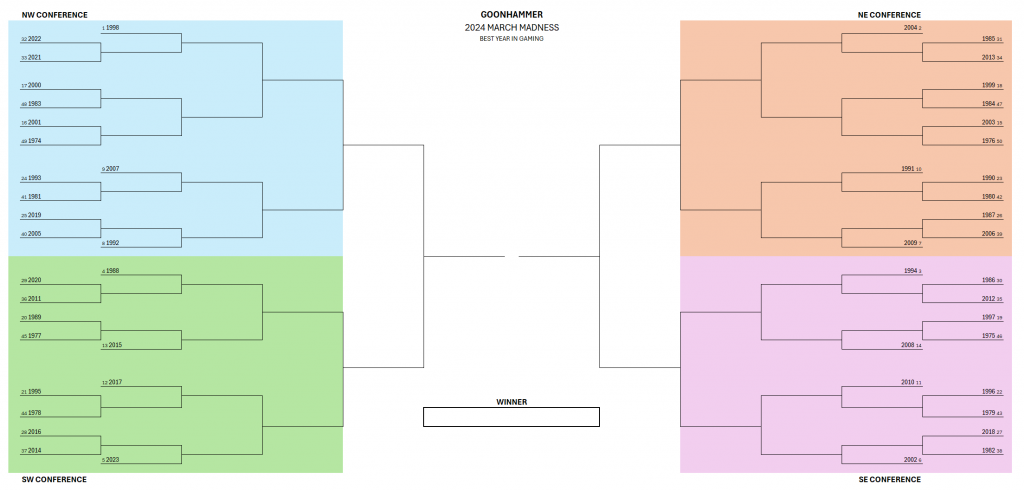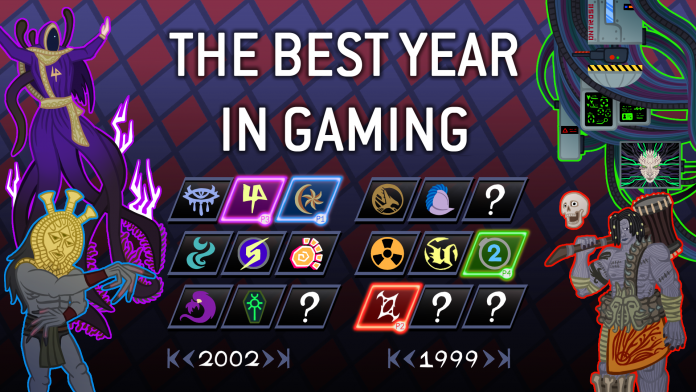Last year was a great year for gaming, with a lot of high-level, extremely popular releases competing for game of the year. But was it the greatest year? It’s an argument worth considering – some years are absolutely better than others, and there are definitely some years we can agree were just generally not great.
As we started talking about this, an idea started forming. March Madness – the name for the annual NCAA Men’s Basketball Tournament – was rapidly approaching, and that’s always a great time to publish stupid stunts. We’ve previously used March Madness for a similar purpose, talking about the Best Game to Ever Win the Spiel Des Jahres. Why not do one for the best year in gaming?
So let’s settle the question. We sat down and did our research, taking a deep look at every year. And we mean deep: Our Best Year in Gaming project doesn’t just look at video games, but also arcades, board games, and the tabletop space. In addition to giving the project a bigger scope, it also makes things more interesting; there’s a lot more to say about some of these years if you are including things like a new edition of Dungeons & Dragons or Carcassone or an amazing expansion for Magic: the Gathering in the mix.
The Rules
The Timeline: We looked back at the last 50 years of gaming, starting in 1974. Why 1974? Because that’s the year Dungeons & Dragons first published and it was also a year with just enough going on in video games to make a case for it in the broader context of this contest. With 1974, you’re talking about the very beginning of the arcade game era – Pong, the first commercially successful arcade game, and the Magnavox Odyssey home console were both released in 1972, giving us two years of runway for competitors to hit the scene and start making games – that’s when things get interesting.
The Years: For each year, we looked at the list of games releasing that year, across the tabletop, arcades, home consoles, and other devices like PCs and mobile phones. We also looked at major trends and changes, such as whether the market crashed that year or VR games suddenly hit big.
Release Dates: When determining what year a game belongs to, we used the game’s original release date (usually on the first platform on which it released). While this leads to some weird spots in the 80s and 90s where games released two years earlier in Japan than the United States, it also helps us avoid issues where a game releases on different platforms or in different countries across a period of 3-5 years. There are a few exceptions to this, but they’re only where notable differences make the game a different experience, such as the Dreamcast release of Soul Calibur, which was notably superior to the arcade release a year prior.
Seeding: After we did our research we went back and rated each year in terms of the quality of the games released, the number of “all-timers,” i.e. games which you’d refer to as one of the best games of all time, the amount of innovation in that year’s games, how wide that year went in terms of genre and platforms, and how novel that year was compared to what came before. This helped build a better point of comparison and helped some of the earlier years compete, as they scored higher on novelty and innovation.
The Bracket
Once that was done we sorted everyone into this bracket:

The Competition
With that out of the way, over the next three weeks we’ll be pitting these years against each other in head-to-head competitions. For each year, one of our authors has written an article running through the year’s major trends, the biggest and most notable games, and the case for why that year was the best year in gaming. We’ll post these head-to-head matchups in a series of articles, and our wonderful Goonhammer Patrons will vote on the years and determine which year advances to the next round.
Sources
A large amount of this was written off the personal experiences of our authors, but there were more than a few times we referred to things like sales figures, review scores, or other historical facts. Where we go into depth we’ll have links to those sources directly in the article and a list you can refer to. We’d also like to note Wikipedia in particular on this, as the site was helpful in compiling our lists of games and pulling some facts and figures. For any given year you can assume at least one or two Wikipedia articles was referenced in its writing. If you’ve got the time and money, we’d strongly recommend donating to the Wikimedia foundation, who host the site. You can donate here.
What’s Next?
Next up, we’re going to start with the Southeast Conference. There are a number of play-in games there, and we’re going to cover each of those games this week, followed by a jump to the Northwest Conference on Friday. So check back shortly for the first matchup.
Have any questions or feedback? Want to place some bets? Tell us what your best year in gaming was? Drop us a note in the comments below or email us at contact@goonhammer.com. And if you want to vote on a particular game, come join us on our Patreon Discord!


